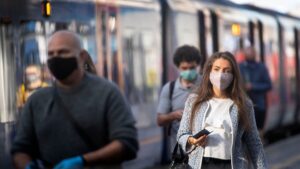Commuters will face an above-inflation hike in rail fares next year, the government has announced.
Regulated fares – which include season tickets – will go up by an average 2.6%, though the increase will be delayed from January until 1 March, the Department for Transport said.
It is one percentage point higher than the 1.6% RPI inflation rate measured in July this year – the benchmark figure which has been used in every year since 2014 to cap price rises.
The Department for Transport (DfT) said the peg to the cost-of-living increase had been abandoned because of billions in taxpayer support being used to subsidise the railways during the pandemic.
But Mick Cash of the Rail, Maritime and Transport union said ticket prices were being “forced up to subsidise private profit”.
Despite being higher than inflation, the 2.6% increase will still be smaller than last year’s increase.
The DfT said the delay in the fares hike to March offered commuters who could not work from home a window to renew season tickets at the existing rate.
It added that more than £4bn had been invested to support the railways since the start of the pandemic, expected to rise to £10bn.
The government took over rail franchise agreements from train operators in March following the collapse in demand caused by the pandemic.
Rail minister Chris Heaton-Harris said: “By setting fares sensibly we are ensuring that taxpayers are not overburdened for their unprecedented contribution, ensuring investment is focused on keeping vital services running and protecting frontline jobs.”
Jacqueline Starr, chief executive of the Rail Delivery Group, representing train operators, acknowledged that “passengers will be disappointed”.
The use of the RPI measure of inflation to set fare increases is already controversial because it tends to be higher than the more widely used CPI measure. This year CPI stood at 1% in July.
Manuel Cortes, general secretary of the Transport Salaried Staff Association, a union, said the above-inflation rise was “extortionate and plain daft”.
“Given the massive economic fallout from the virus, the last thing we need to see is a kick in the teeth for passengers,” Mr Cortes said.

